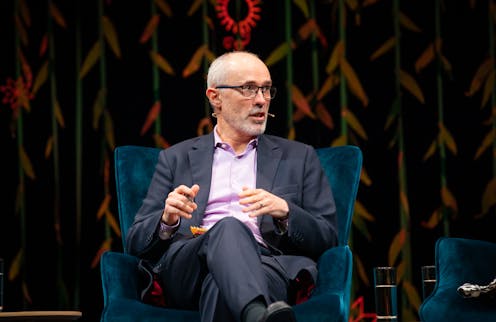Source: The Conversation (Au and NZ) – By Michelle Grattan, Professorial Fellow, University of Canberra

Integrity20.org
Anthony Albanese has now confirmed he’ll be heading to China before the end of the year. He is the first Australian prime minister to visit since 2016, and it is the culmination of an improvement in China-Australia relations since the change of government.
In this podcast, we’re joined by Richard McGregor, an expert on China and senior fellow at the Lowy Institute.
McGregor says the Albanese trip will be particularly important, given the hiatus between prime ministerial visits.
We haven’t had a prime minister in China for six, seven years. We all know why that’s the case, it’s not just COVID. It’s also because Australia’s relationship with China went downhill slowly, then quickly to the point where we didn’t have any political dialogue at all for about two to three years.
Our position in South East Asia, our position in the Pacific and our alliance with the United States all are affected by the China relationship.
While the government has trodden carefully in rebuilding the relationship, McGregor acknowledges there will be risks in the trip. “There are risks, undoubtedly, we’re going up to another level in what the Chinese call a ‘reset’ [and] we studiously call ‘stabilisation’.”
The Chinese see value in stabilising relations with Australia inasmuch as it sort of turns off a very bad signal that the bilateral fight was sending to the rest of the world. Australia and China had deep divisions [and] we made a lot of noise about it.
Many countries which normally wouldn’t really take much notice of Australian foreign policy, particularly in Europe and to some extent in a different way in South East Asia, in Japan and South Korea, have all watched Australia closely for lessons about how to manage the downside of the relationship. And I think that for China, it wasn’t working for them as well for all sorts of reasons.
So the election allowed the beginning of the stabilisation and I think the Chinese are taking advantage of that.
Australia and China have been embroiled in a bitter trade dispute since former Prime Minister Scott Morrison pressed for an investigation into the origin of COVID-19 in 2020. Up to $20 billion worth of Australian exports were targeted by the Chinese government. Recently Trade Minister Don Farrell estimated that has come down to $2.5 billion. On the remaining sanctions McGregor sees a mixed picture.
On the commodities or sectors which are still affected, wine I think is running on its own track – that’s the subject of a World Trade Organisation complaint by Australia. Until we get a draft report with a resolution to that or a decision – Australia seems to expect it will be in our favour – but until we get that we’ll see no movement from China I think.
In the other areas we might get some sort of flashy opening or partial reopening of the punitive trade measures on areas like lobster, around the time Mr. Albanese is to visit. I think that’s a time honoured Chinese technique, to sort of ‘sweeten the tea before it’s drunk’ But no big change I think.
The bulk of [Australian] trade with China, which is dominated by iron ore, LNG and the like, the bulk of that was not affected. That was the fascinating thing about our trade dispute because during that period both sides tried to diversify, and both sides really failed. We still have complementary economies, we sell them stuff that they still need, and China won’t self harm.
While Albanese has flagged there are no concessions in place for the visit, McGregor says if he doesn’t make any progress regarding imprisoned Chinese-Australians Cheng Lei and Yang Hengjun, it will be “embarrassing and damaging” for his reputation:
This is where the risks of the Albanese trip comes in – Australia has constantly said that we would go to China without any preconditions and I think that’s fair enough. But if six months or so after the trip […] there’s been no movement on the two high-profile detainees Cheng Lei and Yang Hengjun, then I think that would be very embarrassing and damaging for Mr Albanese.
Chinese President Xi Jinping and Albanese have a lot of talking points to cover, and McGregor believes Chinese foreign investment in Australia and climate change will be of particular focus:
China is a big, complicated country, but it’s a clean energy superpower. 90% of solar panels in the world are manufactured in China. […] Yes, they are struggling to get their emissions down because their economy is still growing. Just one figure, the share of coal-fired power in the Chinese economy has gone down from about the mid 70’s to 50% in recent years.
Foreign investment is a point of conflict. […] I think Australia’s going to be very restrictive in the area of lithium and rare earths. And I think the Chinese will be raising that quite vociferously. I expect the Australian response at the top table will be vague, but we’ve already made it pretty clear that we’re not going to allow, potentially, a country which has been unfriendly and which we we have not a great deal of trust in investing in there and potentially dominating that industry in Australia.
Other than that, both leaders will be laying out, I think, their view of the world, their view of the region, their concerns about instability in the region and the possibility of conflict. There are all sorts of things that Mr. Albanese will have to raise.
![]()
Michelle Grattan does not work for, consult, own shares in or receive funding from any company or organization that would benefit from this article, and has disclosed no relevant affiliations beyond their academic appointment.
– ref. Politics with Michelle Grattan: Asia expert Richard McGregor on Anthony Albanese’s coming visit to China – https://theconversation.com/politics-with-michelle-grattan-asia-expert-richard-mcgregor-on-anthony-albaneses-coming-visit-to-china-213471



